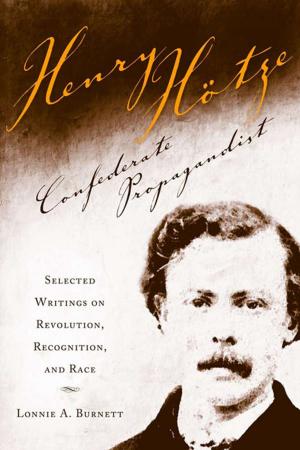So Long! Walt Whitman's Poetry of Death
Fiction & Literature, Literary Theory & Criticism, Poetry History & Criticism| Author: | Harold Aspiz | ISBN: | 9780817381639 |
| Publisher: | University of Alabama Press | Publication: | May 6, 2011 |
| Imprint: | University Alabama Press | Language: | English |
| Author: | Harold Aspiz |
| ISBN: | 9780817381639 |
| Publisher: | University of Alabama Press |
| Publication: | May 6, 2011 |
| Imprint: | University Alabama Press |
| Language: | English |
Explores Whitman’s intimate and lifelong concern with mortality and his troubled speculations about the afterlife.
Walt Whitman is unquestionably a great poet of the joys of living. But, as Harold Aspiz demonstrates in this study, concerns with death and dying define Whitman’s career as thinker, poet, and person. Through a close reading of Leaves of Grass, its constituent poems, particularly “Song of Myself,” and Whitman’s prose and letters, Aspiz charts how the poet’s exuberant celebration of life--the cascade of sounds, sights, and smells that erupt in his verse--is a consequence of his central concern: the ever-presence of death and the prospect of an afterlife.
So Long! devotes particular attention to Whitman’s language and rich artistry in the context of the poet’s social and intellectual milieus. We see Whitman (and his many personae) as a folk prophet announcing a gospel of democracy and immortality; pondering death in alternating moods of acceptance and terror; fantasizing his own dying and his postmortem selfhood; yearning for mates and lovers while conscious of mordant flesh; agonizing over the omnipresence of death in wartime; patiently awaiting death; and launching imaginary journeys toward immortality and godhood.
By exploring Whitman’s faith in death as a meaningful experience, we may understand better how the poet--whether personified as representative man, victim, hero, lover, or visionary--lived so completely on the edge of life.
Harold Aspiz is Professor of English Emeritus at California State University, Long Beach, and author of Walt Whitman and the Body Beautiful.
Explores Whitman’s intimate and lifelong concern with mortality and his troubled speculations about the afterlife.
Walt Whitman is unquestionably a great poet of the joys of living. But, as Harold Aspiz demonstrates in this study, concerns with death and dying define Whitman’s career as thinker, poet, and person. Through a close reading of Leaves of Grass, its constituent poems, particularly “Song of Myself,” and Whitman’s prose and letters, Aspiz charts how the poet’s exuberant celebration of life--the cascade of sounds, sights, and smells that erupt in his verse--is a consequence of his central concern: the ever-presence of death and the prospect of an afterlife.
So Long! devotes particular attention to Whitman’s language and rich artistry in the context of the poet’s social and intellectual milieus. We see Whitman (and his many personae) as a folk prophet announcing a gospel of democracy and immortality; pondering death in alternating moods of acceptance and terror; fantasizing his own dying and his postmortem selfhood; yearning for mates and lovers while conscious of mordant flesh; agonizing over the omnipresence of death in wartime; patiently awaiting death; and launching imaginary journeys toward immortality and godhood.
By exploring Whitman’s faith in death as a meaningful experience, we may understand better how the poet--whether personified as representative man, victim, hero, lover, or visionary--lived so completely on the edge of life.
Harold Aspiz is Professor of English Emeritus at California State University, Long Beach, and author of Walt Whitman and the Body Beautiful.















